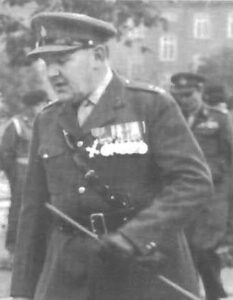After much thought, I find that I cannot do better than quote an extract from the Address delivered by the Hon N.E. Hill-Trevor at a Memorial Service for the late Sir William Lowther, at Overton Parish Church, on Friday 14th May 1982.
“Guy, throughout an ever-busy life, filled many different and varied roles, but first and foremost he was a soldier.

Like his father before him, he was commissioned into the 8th King’s Royal Irish Hussars in 1932.
His sound commonsense, his boundless enthusiasm for all that he did, and certainly for all that was best in life, combined with a dash and speed of decision, raised him above his fellow men. He was, in fact, a natural leader, and remained so throughout his life.
His unswerving loyalty to the 8th Hussars, his infectious gaiety and his sense of humour brought light into the darkest moments and sanity at times when some about him could only see the abyss. If Guy worked hard, he also played hard, and it was only the War that prevented him from being a top-class Polo player, a game at which he showed exceptional brilliance and natural flair.
Having already seen active service in Palestine, he found himself fighting in the Western Desert in 1941, where, after a heavy and bloody conflict, the few remnants of his squadron were overrun and he spent the rest of the War a prisoner.
It was doubtless his spirit and strength of character which equipped him to withstand his ordeal better than many. After the war, the Regiment was stationed for a time in Leicestershire. Guy was back in the Pytchley country where the name of Lowther is a legend, and where, when he was not soldiering, he was hunting.
He was appointed to command the 8th Hussars at the remarkably young age of 38 when his Regiment was fighting in Korea. His reputation as an Armoured Commander in battle and the knowledge of his courage stretched far beyond Korea. His personal confidence when things looked blackest, his good humour in the face of dire adversity, his constant kindness and concern for others, coupled with his ability to keep everyone working in top gear, made him an outstanding Commander. Nowhere was this more evident than during the Battle of the Imjin River.
A valiant warrior more than a technical soldier, Guy once met a senior American General who had arrived to inspect his centurion tanks. He enquired — ‘Colonel, what is the velocity of the shell which comes out of your new gun?’ Guy’s unblinking instant reply was — ‘General, it comes out mighty fast — mighty fast!’ We all recall that he was never lost for a quick reply.
On return from Korea, under Guy’s watchful guidance the Regiment settled quickly into Rhine Army soldiering in Luneburg. It was during this time that Prince Philip was appointed Colonel in Chief. This event gave him enormous satisfaction and woe betide anyone who forgot that this momentous and memorable appointment took place during his command.
After leaving the Army, Guy came home to Erbistock where he busied himself on his farm and everything in the countryside around him. Following his father again, he was appointed Commissioner of the St.John’s Ambulance Brigade for Clwyd, and finally was deputy Chief Commissioner for Wales. He was a Knight of Grace of the Order of St.John.
He was intensely proud of the fact that he was a Member of Her Majesty’s Bodyguard — the Honourable Corps of Gentlemen at Arms — and no Sovereign has ever had a more loyal or devoted servant.
One of the kindest and most generous of men, we shall all remember Guy’s forthright approach, his cheerfulness and his exuberant, totally infectious, sense of humour — these characteristics endeared him to us all.”


